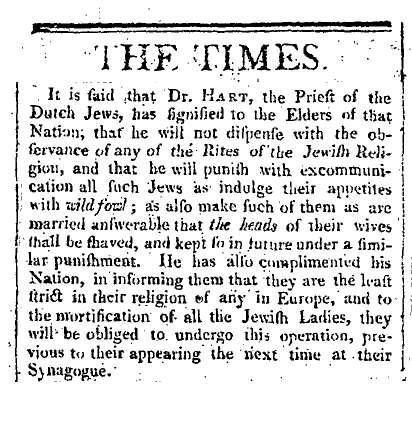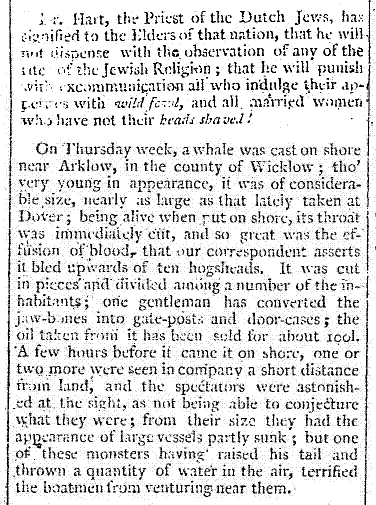In addition, I noted my provisional theory that the origin of the custom may have come about due to a hygienic issue in a time when the Plica Polonica was common, easy means of regular bathing and grooming less so, and covering the head at all times could not have been easy on the hair.
You may think it over and reject it or not. In any event, as far as I know the only Jewish women who maintain the custom of shaving their heads today are descendants of Hungarian-Romanian and Ukrainian-Polish Chassidim. However, it appears from the following source that at one time Yekke, German Ashkenazic, women did so as well.
Below are three sources from 1802 describing the same event. I include all three since two present it with a slightly different nuance and the third is simply the most readable - a clear reprint from the Times of London 10.28.1802. Also, the third one has an extra entry about whales, so that's cool.



As you can see, the "Dr. Hart, the Priest of the Dutch Jews" tried to enforce two religious norms under threat of excommunication. The first is to stop the eating of "wild fowl" and the second is that they are to make sure that their wives shave their head. Not only that, the women are barred from the synagogue until they comply.
"Dr. Hart" is of course Solomon Hirschel, the newly installed av beis din of London. The "Dutch Jews" are the Ashkenazim - in many 18th century English sources Germans are called "Dutch" which is an Anglicized rendering of Deutsch. Hence, the American Amish are also known to this day as the Pennsylvania Dutch, despite their German, not Hollandish, origin.
The Times blurb further editorializes that when he chastised his community for being "the least strict" in all of Europe, he was "complimenting" them. Traditional Jews would not have seen it or taken it as a compliment, but for Christians it was another matter.
As I wrote in another post, eventually R. Solomon would gain a reputation as being more tolerant of wrong-doing. Here we see that he came into office with a bang. I doubt he was trying to enforce head-shaving for long.
His father Rabbi Hirschel Lewin was av beis din of London for a few years in the 1750s and 60s. He was known then as Hart Lyon (hence his son being called "Dr. Hart" in 1802, whereas later it was always Hirschel, after his father's Yiddish name). If the London Jewish community was the "least strict" in Europe in 1802, it wasn't any stricter 40 years earlier. When Rabbi Hart Lyon tendered his resignation, he was asked by synagogue elders why he wanted to leave. He is alleged to have replied "Because that is the first she'eila (religious question) I have ever been asked here."
Getting back to the head-shaving, one wonders two things. First, did Rabbi Solomon Hirschel really mention head-shaving? It's hard to believe that he could have been so deluded as to think that this would fly in his new community. It seems to me that it's possible that he was talking about hair-covering in general, and the gentile press didn't realize that not all European Jewish women who covered their head shaved their hair underneath. So perhaps his chastisement about head/ hair-covering was garbled or misinterpreted. On the other hand, maybe he really was that myopic.
We can learn something about the religious strictness of London Jewry a full generation earlier in the complaints of Rabbi Solomon's father.
"Day by day we can see with our own eyes the decay of our people. We sin and act against the law of God ; all our endeavors are to associate with the Gentiles and to be like them. That is the chief source of all our failings. See, the women wear wigs (פאה נכרית) and the young ones go even further and wear décolleté dresses open two spans low in front and back (יוצאים ערומים מלפניהם ומלאחריהם טפחיים). Their whole aim is not to appear like daughters of Israel." (From a manuscript sermon translated by Charles Duschinsky.)Note that he is critical of wearing a wig. In the 18th century this was not the hallmark of a pious Orthodox woman. Think Marie Antoinette, not Bnei Brak.
Please note also that this is not the sum and substance of Hart Lyon's critiques of the religious backsliding of his community, only what's relevant for this post. This isn't an instance of a rabbi singling out women for not being modest. It's part of a full panoply of criticisms of the religious behaviors he found lacking. Great were his intentions, I am sure, but it seems that it never occurred to him to try anything other than to chastise. It didn't work and he left after 7 years, with his son assuming his office four decades later. Little must have changed.
